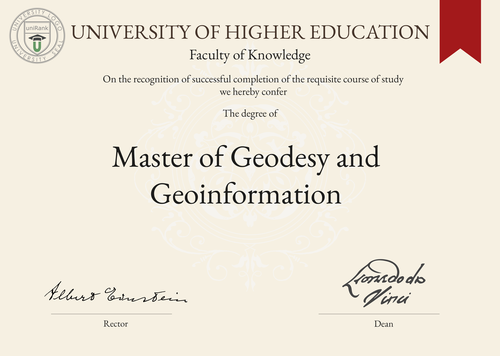
Master of Geodesy and Geoinformation (MGG)
Guide to Master of Geodesy and Geoinformation Program/Course/Degree
Master of Geodesy and Geoinformation (MGG)

Program Name:
Master of Geodesy and GeoinformationProgram or Degree abbreviation:
MGGDuration range:
The duration of the program can vary depending on the country or university, typically ranging from 1 to 2 years.Tuition range:
The tuition fees for the Master of Geodesy and Geoinformation program can vary depending on the country or university, with ranges varying from affordable to expensive.Overview:
The Master of Geodesy and Geoinformation program is designed to provide students with advanced knowledge and skills in the field of geodesy and geoinformation. It focuses on the study of the Earth's shape, gravity field and geodynamic processes, as well as the collection, analysis and interpretation of geospatial data.Curriculum Overview by year:
The curriculum of the Master of Geodesy and Geoinformation program typically includes courses in geodesy, geoinformation systems, remote sensing, spatial analysis, geodetic measurements, geodetic networks and geodetic data processing. Students may also have the opportunity to specialize in areas such as satellite geodesy, geodetic surveying, or geoinformation management.Key Components:
The key components of the Master of Geodesy and Geoinformation program include theoretical knowledge in geodesy and geoinformation, practical skills in geospatial data collection and analysis and the ability to use advanced geoinformation technologies and software.Career Prospects:
Graduates of the Master of Geodesy and Geoinformation program can pursue various career opportunities in both the public and private sectors. They can work as geodesists, geoinformation specialists, surveyors, GIS analysts, remote sensing experts, or consultants in fields such as land management, urban planning, environmental monitoring and disaster management.Salary Expectations:
The salary expectations for graduates of the Master of Geodesy and Geoinformation program can vary depending on factors such as the country, job position and level of experience. Generally, geodesy and geoinformation professionals earn competitive salaries, with the potential for growth and advancement in their careers. For a more accurate understanding of salary expectations, you can utilize the Job Sites Search Engine, from our sister site jobRank, which searches over 4,600 job sites worldwide. Make sure to specify not only the job title but also the country you are interested in.Conclusions:
It is important to note that the duration, tuition fees, curriculum, key components, career prospects and salary expectations of the Master of Geodesy and Geoinformation program can vary depending on the chosen country or location of study, as well as the chosen university. Prospective students are advised to research and compare different programs and universities to find the best fit for their academic and career goals. Furthermore, visitors interested in pursuing a Master of Geodesy and Geoinformation degree can utilize the uniRank World Universities Search Engine to search for universities offering this specific degree anywhere in the world. This search engine provides a comprehensive database of universities and their programs, allowing individuals to explore their options and make informed decisions about their education.World Universities Search Engine
search for Master of Geodesy and Geoinformation (MGG) and add the Location (country, state etc.) or specific University you are interested in studying at.
Query examples:
- Master of Geodesy and Geoinformation (MGG) United States
- Master of Geodesy and Geoinformation (MGG) United Kingdom online
- Master of Geodesy and Geoinformation (MGG) Australia international students
- Master of Geodesy and Geoinformation (MGG) University of California
- Master of Geodesy and Geoinformation (MGG) University of London tuition fees
- Master of Geodesy and Geoinformation (MGG) University of Sydney scholarships
Share Program/Course
Interesting? Share this program/course/degree info with your friends now.